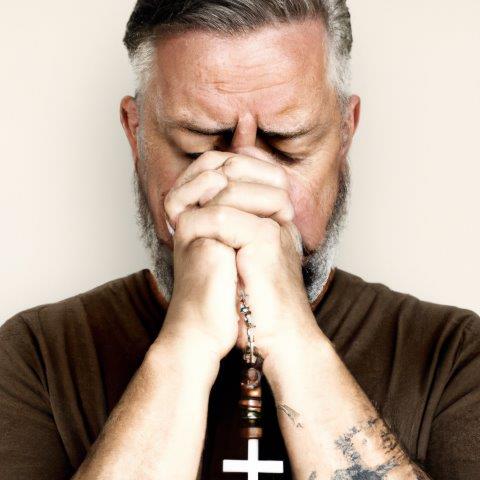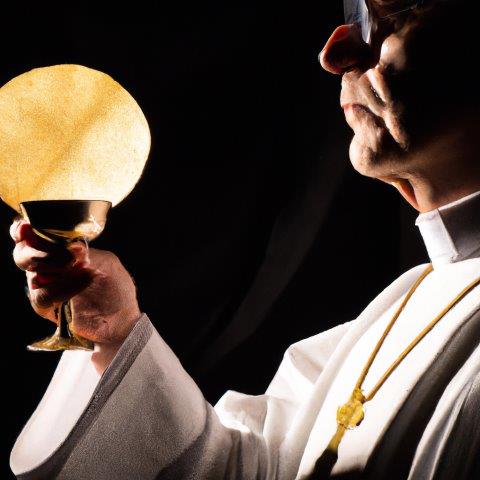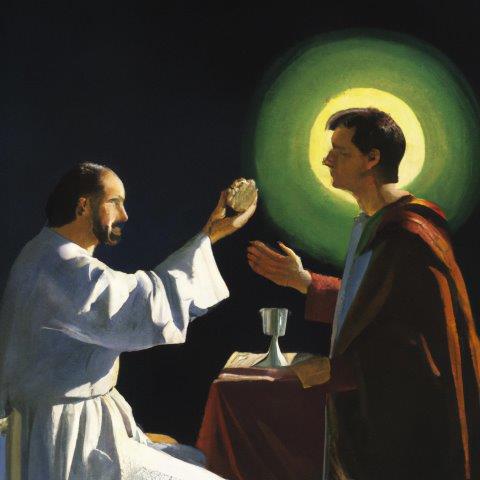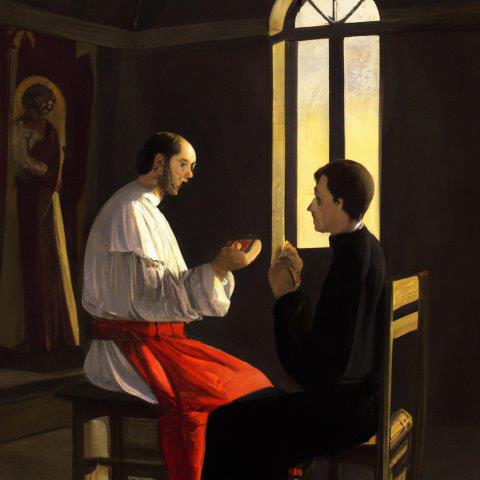Saints
What is a sacrament?
A sacrament is a sacred rite in the Catholic Church that is believed to be a means of grace, instituted by Jesus Christ and entrusted to the Church. The word “sacrament” comes from the Latin word “sacramentum,” which means “a sign of the sacred.” Sacraments are outward signs of inward grace, meaning that they are visible expressions of the grace that God gives to those who participate in them.
 The Church recognizes seven sacraments: Baptism, Confirmation, Holy Eucharist, Penance, Anointing of the Sick, Holy Orders, and Matrimony. Each sacrament confers a specific grace on the person who receives it. For example, Baptism is the sacrament that removes the stain of original sin and incorporates the baptized person into the Church. Confirmation is the sacrament that strengthens the baptized person in their faith and equips them to share that faith with others. The Holy Eucharist is the sacrament that gives the faithful participation in the body and blood of Jesus Christ, and is considered the source and summit of the Christian life. Penance is the sacrament that reconciles the penitent to God and the Church after the commission of sins. Anointing of the Sick is the sacrament that grants the sick person the grace of spiritual and physical healing. Holy Orders is the sacrament that ordains men to the priesthood and consecrates bishops and deacons. Matrimony is the sacrament that consecrates the union of one man and one woman in marriage.
The Church recognizes seven sacraments: Baptism, Confirmation, Holy Eucharist, Penance, Anointing of the Sick, Holy Orders, and Matrimony. Each sacrament confers a specific grace on the person who receives it. For example, Baptism is the sacrament that removes the stain of original sin and incorporates the baptized person into the Church. Confirmation is the sacrament that strengthens the baptized person in their faith and equips them to share that faith with others. The Holy Eucharist is the sacrament that gives the faithful participation in the body and blood of Jesus Christ, and is considered the source and summit of the Christian life. Penance is the sacrament that reconciles the penitent to God and the Church after the commission of sins. Anointing of the Sick is the sacrament that grants the sick person the grace of spiritual and physical healing. Holy Orders is the sacrament that ordains men to the priesthood and consecrates bishops and deacons. Matrimony is the sacrament that consecrates the union of one man and one woman in marriage.
The sacraments are seen as important means of grace that help Catholics grow in their faith and relationship with God. They are also seen as visible signs of the invisible realities of God’s love and presence in the world. For Catholics, the sacraments are not merely symbolic acts, but rather they are believed to be effective channels of God’s grace, through which the person receiving the sacrament is actually changed by the power of the Holy Spirit.
In the Catholic Church, the sacraments are administered by ordained clergy, such as priests and bishops. However, it is important to note that the efficacy of the sacraments does not depend on the worthiness of the minister, but rather on the power of God and the proper disposition of the recipient.
One of the most distinctive features of the Catholic understanding of the sacraments is the belief in the “sacramental principle.” This principle holds that God is present and active in all of creation, and that the material world can be a means of encountering and experiencing the divine. Therefore, Catholics believe that the sacraments are not just human acts, but rather they are actions of Christ himself, in which he continues to offer salvation and grace to the world through the Church.
What are the Seven Sacraments?
-
Baptism – the sacrament that removes the stain of original sin and incorporates the baptized person into the Church.
-
Confirmation – the sacrament that strengthens the baptized person in their faith and equips them to share that faith with others.
-
 First Communion – the sacrament that gives the faithful participation in the body and blood of Jesus Christ, and is considered the source and summit of the Christian life.
First Communion – the sacrament that gives the faithful participation in the body and blood of Jesus Christ, and is considered the source and summit of the Christian life. -
Penance – the sacrament that reconciles the penitent to God and the Church after the commission of sins.
-
Anointing of the Sick – the sacrament that grants the sick person the grace of spiritual and physical healing.
-
Holy Orders – the sacrament that ordains men to the priesthood and consecrates bishops and deacons.
-
Matrimony – the sacrament that consecrates the union of one man and one woman in marriage.
 A sacrament is a sacred rite in the Catholic Church that is believed to be a means of grace, instituted by Jesus Christ and entrusted to the Church. There are seven sacraments in the Church: Baptism, Confirmation, Holy Eucharist, Penance, Anointing of the Sick, Holy Orders, and Matrimony. Each sacrament confers a specific grace on the person who receives it, and is seen as an important means of grace that helps Catholics grow in their faith and relationship with God. The sacraments are administered by ordained clergy and are believed to be effective channels of God’s grace, through which the person receiving the sacrament is actually changed by the power of the Holy Spirit.
A sacrament is a sacred rite in the Catholic Church that is believed to be a means of grace, instituted by Jesus Christ and entrusted to the Church. There are seven sacraments in the Church: Baptism, Confirmation, Holy Eucharist, Penance, Anointing of the Sick, Holy Orders, and Matrimony. Each sacrament confers a specific grace on the person who receives it, and is seen as an important means of grace that helps Catholics grow in their faith and relationship with God. The sacraments are administered by ordained clergy and are believed to be effective channels of God’s grace, through which the person receiving the sacrament is actually changed by the power of the Holy Spirit.
Seven Catholic Sacraments in Detail
-
Baptism – Baptism is the sacrament through which a person is initiated into the Catholic Church. It is seen as the first step in the journey of faith, and is essential for salvation. Baptism involves the pouring of water over the head of the person being baptized, while the priest pronounces the words “I baptize you in the name of the Father, and of the Son, and of the Holy Spirit.” Through baptism, a person becomes a member of the Church, and receives the gift of sanctifying grace.
-
Confirmation – Confirmation is the sacrament in which a person is strengthened in their faith and empowered by the Holy Spirit to live a life of holiness and witness to Christ. It is usually received in adolescence, and involves the anointing with oil, the laying on of hands, and the pronouncement of the words “Be sealed with the gift of the Holy Spirit.” Confirmation is seen as the completion of the sacrament of baptism, and marks the beginning of a deeper, more mature relationship with God.
-
Holy Communion – The Eucharist, also known as Holy Communion, is the sacrament through which Catholics receive the body and blood of Christ. It is seen as the source and summit of the Christian life, and is celebrated during the Mass. Through the Eucharist, Catholics are nourished by the bread of life and the cup of salvation, and are united with Christ and with one another in a profound and mystical way.
-
 Reconciliation – Penance, also known as Reconciliation or Confession, is the sacrament through which Catholics seek forgiveness for their sins and receive absolution from a priest. It involves a process of self-examination, confession of sins, penance, and absolution. Through the sacrament of penance, Catholics are reconciled with God and with the Church, and are empowered to live a life of grace and virtue.
Reconciliation – Penance, also known as Reconciliation or Confession, is the sacrament through which Catholics seek forgiveness for their sins and receive absolution from a priest. It involves a process of self-examination, confession of sins, penance, and absolution. Through the sacrament of penance, Catholics are reconciled with God and with the Church, and are empowered to live a life of grace and virtue. -
Anointing of the Sick – The Anointing of the Sick is the sacrament through which Catholics who are seriously ill or facing surgery or other medical procedures are given the strength and grace to endure their suffering and unite it to the suffering of Christ. It involves the anointing with oil, the laying on of hands, and the prayer of the priest. Through this sacrament, Catholics are comforted, strengthened, and healed, either physically or spiritually.
-
Holy Orders – Holy Orders is the sacrament through which men are ordained as deacons, priests, or bishops in the Catholic Church. It involves a process of discernment, formation, and ordination, and is seen as a call to serve the Church and the world. Through the sacrament of Holy Orders, men are given the grace and authority to preach the Gospel, celebrate the sacraments, and shepherd the people of God.
-
Matrimony – Holy Matrimony, also referred to as Marriage, is the sacrament through which a man and a woman are joined together in a lifelong union of love and fidelity. It involves a process of preparation, consent, and exchange of vows, and is seen as a sacred covenant between the couple and God. Through the sacrament of Matrimony, couples are given the grace and strength to live out their vows, raise children in the faith, and build up the Church and society.
The seven sacraments are an essential part of Catholic theology and practice. They are sacred rituals that mark significant moments in the life of a Catholic, and are seen as channels of grace that bring the faithful closer to God. In this blog post, we will explore the seven Catholic sacraments, their significance, and the role they play in the life of a Catholic.
Gifts for Individuals Receiving One of the Seven Sacraments
The best way to celebrate receiving a sacrament is with a memorable gift that will last a lifetime. Many individuals have an affinity for a particular patron saint. Giving a sterling silver Saint Medal is cherished gift that will serve as a perfect way to commemorate such a blessed milestone.


